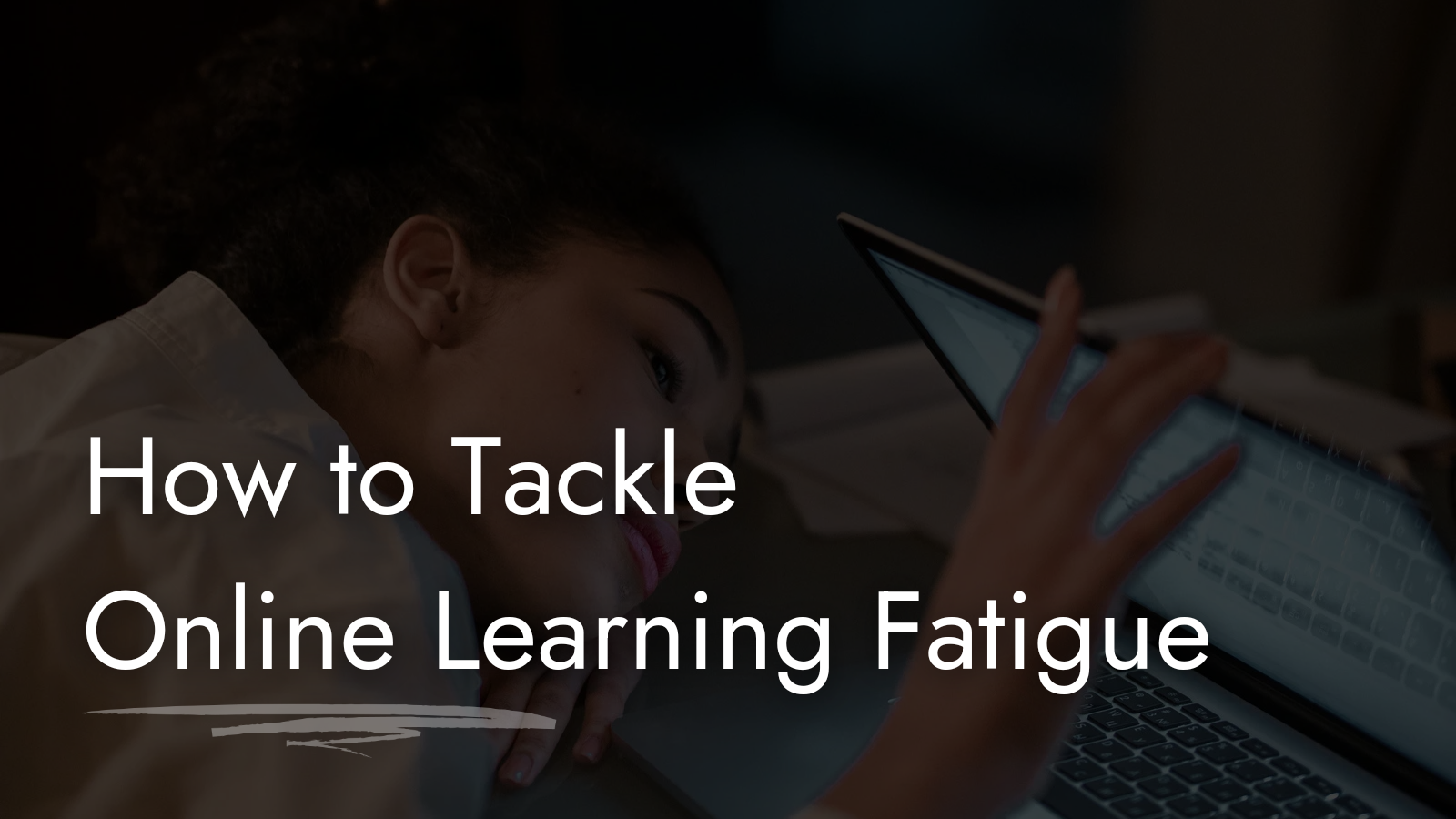Currently Empty: $0.00
aptLearn
How to Tackle Online Learning Fatigue

Information technology has profoundly made our everyday lives easier, and education is no exception. Today, with massive amounts of information available at our fingertips through the internet, access to formal learning and opportunities for communication and collaboration have now become unprecedented in scope.
However, while it has become the new normal, this development has come at the cost of a potential drawback which every student or learner seems to be facing: online learning fatigue.

Stemming from constantly learning online and being plugged in on our devices all the time, online learning fatigue prevents students from focusing and learning to the fullest. Research has also shown that students have lost excitement about learning, struggled to set boundaries, and perhaps stopped showing up altogether as a result of this phenomenon.
And considering that the future of technology in education looks increasingly digital, it’s essential that we find a way to tackle this challenge. If you learn online, hybrid, or even use technology in the classroom, this article may be helpful for you in effectively overcoming online learning fatigue.
First. Let’s look at what it means and how it affects overall productivity and outcome.
What is Online Learning Fatigue?
Online learning fatigue is the overwhelming sense of exhaustion, both physical and mental, that occurs due to excessive use of technological tools and apps concurrently for a long period of time.
Unlike the traditional classroom teaching environment where students get to learn and hone their social skills while physically interacting with their teachers, and peers, students learning online sit and stare at an LCD screen for up to 6 hours a day, making this method of learning monotonous, exhaustive, and pretty less attractive.
Posing a challenge to learning and development, online learning fatigue may cause students to experience burnout, stress, laziness, difficulty to concentrate, exhaustion, frustration, as well as body aches. Accordingly, a recent study observed that in many cases, enthusiastic students who initially showed interest in online learning have turned away from it later due to lack of motivation.
Despite these numerous challenges that come with online learning, there are ways to maximize your learning without getting fatigued. If you want to know more about this, keep reading.
7 Practices to Combating Online Learning Fatigue
Let’s help you manage online learning fatigue with these 7 best-expert recommended practices:
Keep it Flexible
One distinguishing feature that makes online learning appealing is the option for self-pacing – learning at one’s schedule, and will. This freedom can alleviate a lot of stress and the pressure to get the learning done all at once.
While you’re about getting your courses completed, ensure that you reinforce this feature into your learning plan to suit your schedule. This will help you learn more efficiently, and produce better results. You don’t have to rush the learning process. Break them into bits, and move at a pace that’s convenient for you.
Reward Yourself
Outside of setting small achievable goals, and making your learning pace flexible, you can also improve your attitude towards online learning by acknowledging and rewarding yourself after each feat. For example, when you complete a task, you can reward yourself with the littlest things like a few hours of game time, a new episode from your favorite show, an item you’ve been eyeing, or a quick nap.
Ultimately, when you celebrate your success, you tend to feel appreciated, less tense, and motivated to keep learning.
Cultivate Good Sitting Posture
Students get easily carried away during long study sessions, forgetting about the importance of keeping good sitting postures while studying. We believe that as long as we can study, it doesn’t matter how we actually sit. Research has however shown that this habit actually affects us, and our performances more than we think.
Whether sitting or standing, the best posture for studying is when all the curves of your vertebral column at the neck, mid-back, and lower back are correctly maintained and aligned. Bending your spine too much or putting excessive pressure on it affects our muscles and psychological factors like confidence, energy, concentration, memory, focus, and cognitive stress.
Prioritize Mental & Physical Health
Whether it is mental health, physical health, or a combination of both, students have had their own share of the effects of online learning on their general well-being. However, prioritizing mental and physical health practices helps in alleviating the risks to the adverse effects of this learning approach on health.
Creating SMART goals, sleeping more, reducing screen time, getting hydrated, maintaining a healthy diet, using photochromic glasses, and paying attention to your body are mental and physical health tips that you can adopt in combating online learning fatigue. Find more tips here.
Remember always as you learn digitally, your health is wealth.
Make it Fun
You’re most definitely familiar with the saying “all work and no play makes jack a dull boy”. Well, yes, this applies to online learning too.
Truthfully, online learning and training can be so uninteresting and tiresome due to its monotonous nature. However, there are various ways you can make digital learning fun and less burdensome for yourself.
You can try playing mood-boosting study music while learning, getting a study or accountability partner, rewarding yourself after completing each study goal, or participating in open source group projects.
Get Physical
Online learning means we’re spending additional hours in front of our digital devices compared to our routinely screen time hours. This, in fact, has been observed to be the primary cause of online learning fatigue.
To relieve yourself from this fatigue, and get the learning groove back, you need to take regular breaks from your screen in between your learning to get physical. For example, going for a walk, jogging, eating, exercising, driving, or sitting to enjoy nature are all physical activities that can help reduce your stress level.
This will not only help in refreshing your brain and body, but also increase your energy, productivity, and ability to focus.
Make Time To Socialize
Because online learners do most of their schooling from home, it takes away the opportunity for face-to-face interactions with their instructors, fellow students, or people, at large. As a result, students who spend the bulk of their time online can start experiencing signs of social isolation, making it difficult for them to create a sense of community. This often leads to heightened stress, anxiety, mood swings, and negative thoughts.
Hence, fixing time to socialize into your schedule becomes quite necessary for you as you spend more time online.
You can try to visit friends more often, get on a call with old pals, go on friendship dates, or join a group that is focused on a hobby you enjoy. This will help you cope with stress, build a sense of belonging, and of course, help you learn productively.
In Closing
Inarguably, the way we learn and train has evolved over time. With technology, you can now study at home, anywhere, or wherever you are as long as you’re connected to the internet.
However, despite proven to be a successful method of learning that offers a number of benefits when compared with traditional education, the almost total shift to online learning comes with a potential downside known as online learning fatigue. As a result, students experience difficulty completing their courses, lose their motivation, and show low retention rate; all of which affect their learning performance and progress.
While there is no one-way answer to alleviating online learning fatigue, there are ample small steps you can take to make your learning easier, and less demanding. And we’ve identified some of them in this article.

